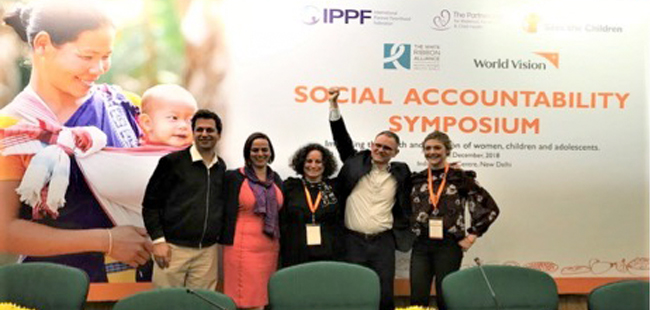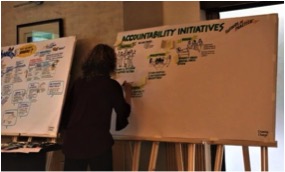
Leaders, experts, researchers and citizens from all around the world convened in New Delhi, India on 10 and 11 December 2018 to attend the Social Accountability Symposium - a key milestone in advancing knowledge and best-practices relating to social accountability for improved health and nutrition for women, children and adolescents.
The Symposium, co-organized by The Partnership for Maternal, Newborn & Child Health (PMNCH) and the organizations of the Citizen-Led Accountability Coalition (CLAC), served as a platform for knowledge exchange based on both research and experience in social accountability and enabled for rich discussions on lessons learned and key, prevailing issues in the implementation and sustainability of social accountability today to build on the existing progress.
Social accountability, which is also referred to as political accountability or demand-led accountability, is characterized by its core elements of targeted civic education or information, collective action and government accountability response. Central to this is the basic human right to health for all, including marginalized people and most vulnerable populations, such as children and women.

WHO
Avril Orloff (Drawing Change)
The 2-day symposium consolidated the evidence base on successful and impactful social accountability strategies, practices and frameworks to support the scale-up for positive health and nutrition outcomes and increased empowerment and participation of citizens in health. It highlighted the importance of the shifting view of social accountability away from being just a tool or mechanism for action, towards a more long-term process of deepening citizen and community engagement with authorities to ensure demands and needs of citizens and communities are addressed, while advancing progress as per targets set out by governments and policy-makers.
The symposium also emphasized the importance of context-relevant initiatives, of building movements such as peer-to-peer networks, of fostering collaboration between stakeholders, governments and citizens, and of better understanding for increased alignment and cooperation. The role played by the media was highlighted as a crucial component of ensuring accountability. Participants shared their experiences of linking local, national and global
accountability efforts and provided insights on the successful implementation of local-level social accountability initiatives.

WHO
From left to right: Moses Muwonge (Samasha Medical Foundation), Andrew Schrank (Brown University), Moses Ngulube (Care International), Thiago Luchesi (Save the Children International), Annie Portela (World Health Organization).
Although progress has been made in recent years in establishing a solid evidence base for what social accountability is, further work is needed to move forward from here to determine how to successfully implement and monitor it, why it sometimes fails and who should be driving the agenda. Three main challenges identified through discussions were: (1) the changing nature of civic spaces, with greater opportunities for politicians to interact directly with citizens via social media; (2) increased instability resulting from violence, conflict and/or social, economic and political fragility which contributes to the weakening of social contracts; and (3) the complexity of rights-based public accountability embedded in long-term political processes. And as social accountability is inherently a
political process, the discussion also brought forth the important role of government leadership and support throughout social accountability processes for successful outcomes. It also highlighted the lack of research to support risk mitigation and negative effects that could arise should social accountability initiatives be unwelcome in the current political environment, therefore limiting the ability of stakeholders to make educated decisions on how best to respond.



.png?sfvrsn=6d0e27cd_1)




